|
|
|
Sort Order |
|
|
|
Items / Page
|
|
|
|
|
|
|
| Srl | Item |
| 1 |
ID:
119027
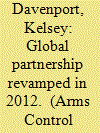

|
|
|
| 2 |
ID:
120921
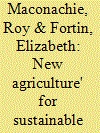

|
|
|
|
|
| Publication |
2013.
|
| Summary/Abstract |
In sub-Saharan Africa, commercial bioenergy production has been hailed as a new form of 'green capitalism' that will deliver 'win-win' outcomes and 'pro poor' development. Yet in an era of global economic recession and soaring food prices, biofuel 'sustainability' has been at the centre of controversy. This paper focuses on the case of post-war Sierra Leone, a country that has over the last decade been consistently ranked as one of the poorest in the world, facing food insecurity, high unemployment and entrenched poverty. Following a recent government strategy to secure foreign direct investment in biofuels production in agriculturally rich regions of the country, the largest foreign investment in Sierra Leone since the end of its civil war has been secured: a Swiss company is to invest US$368 million into a large-scale biofuels project over the course of 3 years, and promises to simultaneously stimulate an enabling environment for investment, provide job opportunities for youth and increase food production. For multiple actors involved in the project, the concept of 'sustainability' is crucial but accordingly there are varying interpretations of its meaning. Such differences in interpretation and the complex contradictions within discourses of sustainability are in turn framed by the various scales within which these actors are situated. While attempts have been made to manage these contradictions through global sustainability standards, the unequal power relations between different actors will ultimately determine the ways in which they are likely to be resolved. The paper concludes by reflecting on how these processes may be contributing to a changing governance landscape and wider global political economy within which bioenergy is being produced, processed and consumed.
|
|
|
|
|
|
|
|
|
|
|
|
|
|
|
|
| 3 |
ID:
129107
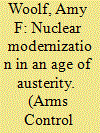

|
|
|
|
|
| Publication |
2014.
|
| Summary/Abstract |
When Secretary of Defense Chuck Hagel spoke about U.S. nuclear forces at F.E. Warren Air Force Base in early January, he emphasized two key points. First, he declared that the United States was "going to invest in the modernization we need to invest in to keep that deterrent stronger than it's ever been." He then added that "we're going to continue to require every element of our nuclear deterrent in the triad."[1] His audience at the Wyoming base might have heard a welcome, if unexceptional, commitment to the future of the U.S. nuclear deterrent, but there could have been more to the secretary's comments. In this period of fiscal constraints and declining defense budgets, many in in the wider policy community are voicing doubts about the ability of the United not only to maintain all three legs of the nuclear triad, but also to replace each leg with new missiles, bombers, and submarines. Although the current debate over the future composition of the U.S. nuclear arsenal often is framed in fiscal terms, it is more about the future need for and role of nuclear weapons than it is about how much money the U.S. government is going to spend on them. Critics of the current plans to modernize the U.S. nuclear force structure argue that the investments are excessive because nuclear weapons are less relevant to U.S. national security in the 21st century than they were in the past. Supporters argue that this investment is necessary because nuclear weapons continue to play a critical role in U.S. national security. Regardless, if defense budgets continue to decline in the coming decades, the country may face difficult and possibly illogical trade-offs as it pays for the rising cost of nuclear modernization. The United States deploys strategic nuclear warheads on three types of delivery vehicles: long-range, land-based intercontinental ballistic missiles (ICBMs), long-range submarine-launched ballistic missiles (SLBMs), and long-range heavy bombers based in the United States. Each of the delivery systems in the U.S. nuclear force is aging, and all could reach the end of their service lives in the next 30 years. The warheads that these systems would deliver also are more than 25 years old and contain aging components that may raise questions about their reliability in the future
|
|
|
|
|
|
|
|
|
|
|
|
|
|
|
|
| 4 |
ID:
128990
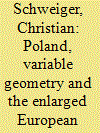

|
|
|
|
|
| Publication |
2014.
|
| Summary/Abstract |
This article examines the role of Poland in the European Union, where the traditional Franco-German leadership axis has been replaced by a new 'variable geometry' of leadership constellations across a variety of policy areas. In this setting Poland has the potential to move from maintaining an initially passive role as a policy-taker towards becoming an agenda-setter alongside other larger and more traditionally dominant member states, especially Germany. However, Poland's success in this matter and subsequent influence on a variety of European Union policy areas, particularly the single market and the European Union's external relations, will substantially depend on the extent of its economic recovery from the effects of the global economic recession and wider developments in the European Union's debt crisis as well as its willingness to engage in constellations of member states that go beyond its traditional partners.
|
|
|
|
|
|
|
|
|
|
|
|
|
|
|
|
| 5 |
ID:
111031
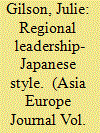

|
|
|
|
|
| Publication |
2012.
|
| Summary/Abstract |
The Japanese government faces many competing challenges as it seeks to balance its multilateral and bilateral relationships within and beyond the region: whilst addressing its rapidly changing contentious domestic politics, there is pressure for it to realign relations with the USA, manage the rise of China, strengthen links with its region and continue to deal with its lingering historical legacy. All of these demands are now set against the backdrop of a so-called 'lost decade' of economic woes and global economic recession. This article demonstrates how the Japanese government is apparently adopting a de facto multilevel foreign policy, attempting to engage in a range of bilateral and collective initiatives simultaneously and to assume a regional leadership role whilst having to manage difficult bilateral relations, notably with the USA and China.
|
|
|
|
|
|
|
|
|
|
|
|
|
|
|
|
| 6 |
ID:
127441
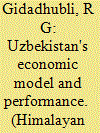

|
|
|
|
|
|
|
|